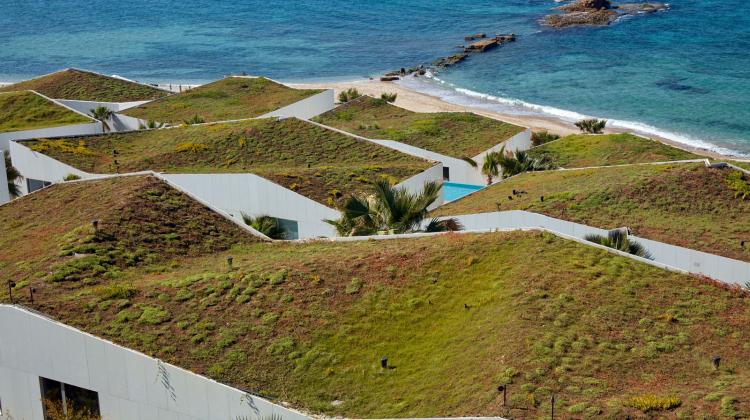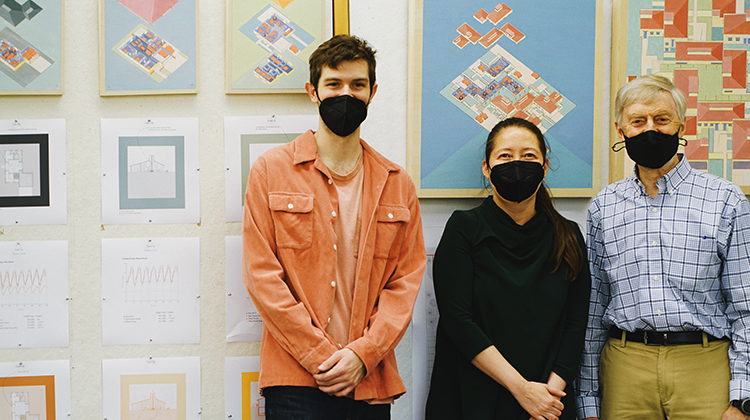Special Subject: Building Technology — The computational design, engineering, and fabrication of large scale sculptural rope networks
During this workshop participants will learn about the design, engineering, and fabrication of rope structures in the work of MIT Distinguished Visiting Artist, Janet Echelman. They will then explore the design and fabrication of tensioned networks through physical modeling and computational tools. First they will individually explore small scale structures and then they will collaboratively produce an architectural scale rope structure.
Midway through the week there will be a session teaching the basics of rope splicing led by structural engineer, Nicole Wang, who has deep expertise in the engineering of Janet Echelman’s sculptures. This session will provide a foundation for the final stage of the workshop where a room scale structure will be collaboratively fabricated using spliced connections.
Participants will need a laptop and Rhino 7 installed on their computer prior to the workshop to work with the design tool.
Space and materials are limited so registration is required. Please contact aburke3@mit.edu if you have any questions.
Preparation for Building Technology PhD Thesis
Selection of thesis topic, definition of method of approach, and preparation of thesis proposal. Independent study supplemented by individual conference with faculty.
Preparation for BT Thesis
Selection of thesis topic, definition of method of approach, and preparation of thesis proposal. Independent study supplemented by individual conference with faculty.
Creative Machine Learning for Design
This class is a pre-approved Computation elective for Spring 2023.
Focuses on applications of machine learning (ML) for creative design generation and data-informed design exploration, with an emphasis on visual and 3-D generative systems. Explores how recent advances in artificial intelligence, and specifically machine learning, can offer humans more natural, performance-driven design processes. Covers a wide range of machine learning algorithms and their applications to design, with topics including neural networks, generative adversarial networks, variational autoencoders, dimensionality reduction, geometric deep learning, and other ML techniques. Includes an open-ended, applied research or design project demonstrating an original, creative use of machine learning for design, architecture, engineering, or art.
From the Solar House to Net Zero Buildings
UG: 4.441; Grad: 4.442
Provides necessary historic awareness and technical skills for becoming agents of change for a carbon neutral building sector by further merging the fields of architectural design and environmental performance analysis. Students are presented with a "typical" building and explore various interventions, from envelope improvements to reduced internal lighting and equipment loads, ventilation and HVAC upgrades as well as onsite deployment of photovoltaics. Discusses which energy flows to pay attention to for different building types and how to productively work with the local microclimate, knowledge which can later promote elevated discussions between architect and environmental consultant.
Students taking graduate version complete additional assignments.
Introduction to Structural Design
Note: 3/8/23 - 4.462 lab schedule changed to W 5-7 in room 8-205
UG: 4.440, 1.056; Grad: 4.462
Introduces the design and behavior of large-scale structures and structural materials. Emphasizes the development of structural form and the principles of structural design. Presents design methods for timber, masonry, concrete and steel applied to long-span roof systems, bridges, and high-rise buildings. Includes environmental assessment of structural systems and materials. In laboratory sessions, students solve structural problems by building and testing simple models. Graduate and undergraduate students have separate lab sections.
Space-Conditioning Systems for Low-Carbon Buildings
Consensus understanding of climate change identifies a need to drastically reduce anthropogenic emissions of greenhouse gases in coming decades, including those associated with buildings. In this course, we seek a thermofluids understanding of the basics of natural and mechanical systems for conditioning high-performance buildings and will develop and assess systems based on this understanding. We will for new and existing buildings. Can these and other buildings, large or small, meet municipal and global goals for decarbonization? Should they simply depend on a decarbonized grid or can energy consumption be substantially reduced relative to current practice? Can they be maintained at a comfortable temperature with little or no use of mechanical systems? Can waste heat at building or community scale be effectively captured and reused – or, at last resort, transferred to the environment with minimal environmental and financial cost?
Topics include the thermal and fluid dynamics of airflow in buildings, application to multi-zone wind- and buoyancy-driven airflows. Building cooling strategies will be motivated by mapping conventional and innovative cooling systems on the psychrometric chart. First-principles analysis and simulations with an equation-based language, Modelica, and with EnergyPlus will be used to quantify the performance of energy recovery systems, membrane- and desiccant-based dehumidification, evaporative cooling, thermal storage at diurnal (building materials) and annual (ground-coupled heat pumps) scales and radiant cooling and heat-rejection systems. Current-practice and advanced district heating and cooling systems will be explored. Working in groups and making use of design workflows under development at MIT and Harvard, we will assess climate- and building-specific systems based on thermal comfort, energy consumption, carbon emissions and resilience to climate change. Project-based testing of speculative proposals, based on natural or man-made systems, will be encouraged.
Preparation for Building Technology PhD Thesis
Selection of thesis topic, definition of method of approach, and preparation of thesis proposal. Independent study supplemented by individual conference with faculty.




